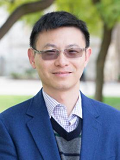Transforming Construction: The Shift from Traditional Practices to Intelligent Systems
Time
3:00 PM, April 23, 2025 (Beijing)5:00 PM, April 23, 2025 (Sydney)
Contact Us
Email: jbdejournal@sciexplor.comSpeaker

Prof. Xiangyu Wang
School of Civil Engineering and Architecture, East China Jiaotong University, Nanchang, Jiangxi, China.
Prof. Xiangyu Wang is a PhD/Master's Supervisor, Distinguished Professor, and Executive Director of the Institute of Intelligent Construction and Maintenance of Civil Infrastructure at East China Jiaotong University.
• Fellow of the European Union Academy of Sciences (EUAS)
• Founding President of the International Society for Smart Construction & Production
• Vice President of the International Association for Automation and Robotics in Construction (industry collaboration)
• Fellow of the European Union Academy of Sciences (EUAS)
• Founding President of the International Society for Smart Construction & Production
• Vice President of the International Association for Automation and Robotics in Construction (industry collaboration)
Academic Achievements:
• 500+ publications, including including 320+ SCI/SSCI papers, 38 ESI global top 1% highly cited papers, and 16 ESI global top 0.1% hot papers
• 14,367 citations in Web of Science, H-index: 75 (Scopus)
• Listed among the "World's Top 2% Scientists" by Stanford University (2023)
• Ranked #1 globally in highly cited papers in Building and Construction, Civil Engineering, and Transportation in 2022, among only ten scientists worldwide (Clarivate)
• Ranked #1 globally in the fields of Building Information Modeling (BIM), Infrastructure Management, Smart Cities, and Automation & Robotics (Google Scholar Citations)
• Ranked #13 globally in the field of Augmented Reality (ScholarGPS)
• Most prolific scholar globally in the BIM field on WOS (Ranked #1)
• 500+ publications, including including 320+ SCI/SSCI papers, 38 ESI global top 1% highly cited papers, and 16 ESI global top 0.1% hot papers
• 14,367 citations in Web of Science, H-index: 75 (Scopus)
• Listed among the "World's Top 2% Scientists" by Stanford University (2023)
• Ranked #1 globally in highly cited papers in Building and Construction, Civil Engineering, and Transportation in 2022, among only ten scientists worldwide (Clarivate)
• Ranked #1 globally in the fields of Building Information Modeling (BIM), Infrastructure Management, Smart Cities, and Automation & Robotics (Google Scholar Citations)
• Ranked #13 globally in the field of Augmented Reality (ScholarGPS)
• Most prolific scholar globally in the BIM field on WOS (Ranked #1)
Host

Prof. Jian Zuo
School of Architecture and Civil Engineering, The University of Adelaide, Adelaide, SA, Australia.
Prof. Jian Zuo is a Professor of sustainable construction, School of Architecture and Civil Engineering, The University of Adelaide. He is the chief investigator of a number of projects funded by Australian governments such as the Australian Research Council and Australian Housing and Urban Research Institute.
His main research interest relates to achieve good health, safety and sustainability at both building and urban levels. He has published over 100 peer-reviewed papers in international journals and 11 ESI Highly Cited Papers. His research is well recognized by the academic society, drawing more than 23,580 citations since 2020 with H-index of 94 (Google Scholar). Professor Zuo has close relationship with the industry. He has been engaged by both Australian and international professional bodies to review green building and low carbon city development tools as well as resource efficiency issues.
Introduction
This presentation offers an in-depth exploration of the transformation of the construction industry from traditional practices to the integration of advanced intelligent technologies, centring on the innovative concept of the "Engineering Brain" and its implications for future development.
It begins by examining the evolution of intelligent construction through four distinct stages, highlighting the technological breakthroughs and representative innovations that define each phase. The theoretical framework of the "Engineering Brain" is then introduced, providing a comprehensive overview of its underlying principles and a detailed explanation of the five critical components that form the foundation of intelligent construction systems based on this concept. The discussion further delves into the practical implementation of intelligent construction systems, structured into three progressive phases. The first phase is explored in detail, supported by an analysis of three engineering case studies that demonstrate the application and effectiveness of this approach in real-world scenarios. These examples illustrate how the Engineering Brain framework is transforming construction processes, enabling smarter decision-making and enhanced operational efficiency.
The presentation concludes with a forward-looking perspective, addressing the potential of Engineering Brain-driven intelligent construction systems to reshape the industry. It identifies emerging trends, future research directions, and the anticipated challenges and opportunities as the construction sector continues to embrace digitalisation and intelligent solutions. This comprehensive overview provides valuable insights into the transformative impact of the Engineering Brain on the future of construction.
Presentation
Presentation
227
Journal Introduction
195



